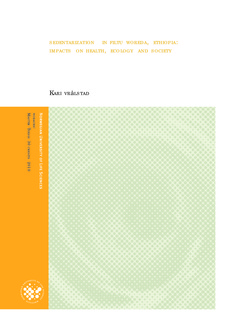| dc.description.abstract | This thesis is about the sedentarization process in Filtu Woreda of the Somali Region in Ethiopia. Sedentarization is described as the transition from a more nomadic to a less nomadic or sedentary livelihood for pastoralists. In Filtu Woreda, this transition is occurring due to many reasons, among them drought, pressure from governments, and demand for education and development. The sedentarization process has, however, both positive and negative impacts on the pastoral livelihoods. In terms of Health, the sedentary life has enabled pastoralists to access health services, water and sanitation facilities, but it has also increased the risks of disease transmission and poorer nutrition. When sanitation facilities, health services and safe water quality lack in settled communities the consequences can be fatal. In terms of Ecology, the sedentarization process naturally leads to higher density of humans and animals, and thus often higher pressure on pastures in the same area. In Filtu Woreda, the respondents linked the increased density to reduced grass, bush encroachment and less rainfall, although no direct connection between these factors is documented in this thesis. Sedentarization had also enabled the pastoralists to engage more in agriculture, at the same time as this indicated a shift from a livestock-based economy with primarily home consumption to a more marked-oriented economy. In terms of Society, the sedentarization process did not seem to impact the rates of conflicts in the visited area, however examples from similar processes exemplifies the importance of awareness and carefulness when such processes are encouraged. The thesis further highlights the positive impact of education from the sedentarization process in Filtu Woreda; and the access to water which has changed pastoralists’ livelihood tremendously. Lastly, the thesis looks into the impacts on gender roles, culture, community and participation, which shows positive trends as well as further challenges. It is the impression of the researcher that the sedentarization process in Filtu Woreda is both loved and disliked among the respondents, although none of them regretted the choice to settle. It had met some demands, and created others; it had brought improvement to their livelihood, but also some challenges. These different impacts of the sedentarization process are discovered and described in this thesis in order to improve the policies and activities of development schemes targeting pastoralists in the transition from a nomadic to a sedentary life. | en_US |
